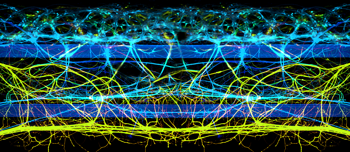On-demand Webinar
 Chemotherapy-induced peripheral neuropathy (CIPN) is a common neurological complication associated with widely prescribed chemotherapeutics, such as microtubule inhibitors (MTis). Antibody-drug conjugates (ADCs) are an innovative class of cancer therapeutics designed to target cytotoxic payloads, including MTis, directly to cancer cells with the aim of increasing the therapeutic window of their payload.
Chemotherapy-induced peripheral neuropathy (CIPN) is a common neurological complication associated with widely prescribed chemotherapeutics, such as microtubule inhibitors (MTis). Antibody-drug conjugates (ADCs) are an innovative class of cancer therapeutics designed to target cytotoxic payloads, including MTis, directly to cancer cells with the aim of increasing the therapeutic window of their payload.
To aid pre-clinical in vitro toxicity evaluation of drug compounds, we developed a robust model to study neurite outgrowth and damage in 3D and demonstrate that MTis of different chemistry classes induce neurite damage. Importantly, the model’s pre-clinical relevance is reflected by its ability to capture neurite damage induced by ADCETRIS®, a clinically approved ADC known to cause CIPN in clinical settings.
Watch our on-demand webinar to learn how this model has the potential to be utilized as a tool to predict neurotoxic effects of novel ADCs to enable safety predictions at early stages in the development process.
In this webinar, you will:
- Learn about comprehensive 3D in vitro modeling of nerve damage induced by MTi chemotherapeutics
- Explore how our developed model may be used as a tool to better investigate the toxicity of ADCs
- Discover how partnering with MIMETAS can aid in your drug discovery, mitigating toxic side-effects of compounds and yielding better future treatments
Access the recording here
Speakers
 Catherine Rodger, PhD is a Senior Scientist within the Oncology Safety Department at AstraZeneca. She completed her MSci degree in Biochemistry at the University of Glasgow before embarking on her PhD at the MRC Protein Phosphorylation and Ubiquitylation Unit in Dundee. Catherine subsequently worked as a Postdoctoral Researcher at the Cambridge Institute for Medical Research prior to starting her current position at AstraZeneca where she focuses on non-clinical safety assessment of ADCs, including the application of advanced in vitro models to characterise and mitigate target- and modality-related safety risks in discovery programs.
Catherine Rodger, PhD is a Senior Scientist within the Oncology Safety Department at AstraZeneca. She completed her MSci degree in Biochemistry at the University of Glasgow before embarking on her PhD at the MRC Protein Phosphorylation and Ubiquitylation Unit in Dundee. Catherine subsequently worked as a Postdoctoral Researcher at the Cambridge Institute for Medical Research prior to starting her current position at AstraZeneca where she focuses on non-clinical safety assessment of ADCs, including the application of advanced in vitro models to characterise and mitigate target- and modality-related safety risks in discovery programs.
 Xandor Spijkers is a Scientific Project Lead at MIMETAS. He completed his bachelor’s degree in Neuropsychology at Tilburg University, after which he went on to do a research master's program in Neurosciences at the VU University. His PhD research was a collaborative project between MIMETAS and the University Medical Centre Utrecht and focused on Amyotrophic Lateral Sclerosis (ALS). His current work is oriented towards models of the central and peripheral nervous system
Xandor Spijkers is a Scientific Project Lead at MIMETAS. He completed his bachelor’s degree in Neuropsychology at Tilburg University, after which he went on to do a research master's program in Neurosciences at the VU University. His PhD research was a collaborative project between MIMETAS and the University Medical Centre Utrecht and focused on Amyotrophic Lateral Sclerosis (ALS). His current work is oriented towards models of the central and peripheral nervous system
